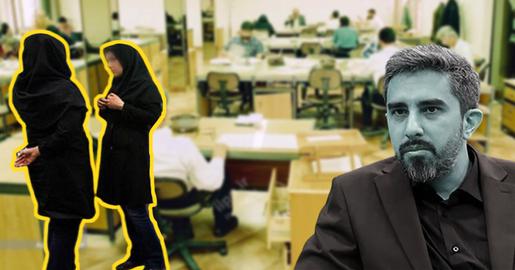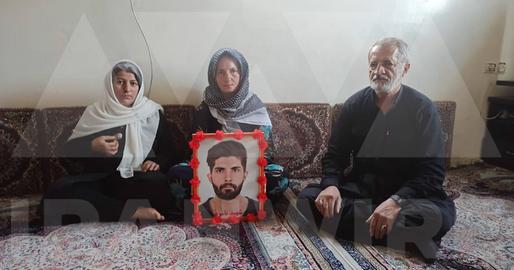The following piece was written by an Iranian citizen journalist on the ground inside the country, who writes under a pseudonym to protect her identity.
Mohammad Shafei is 65 years old and has spent the past five years in his hut, day and night. It is the realization of a childhood dream, but it is not a treehouse. Rather, the wooden hut sits over the bed of his made-in-Iran Saipa van. After 50 years doing auto upholstery, he built it for his retirement.
I notice his van-hut in one of the main streets in central Tehran. As I am taking photographs, he comes out of one of the shops around the corner and cheerfully says, “Allow me to open the door so you can take photos of the inside as well.”
A little later he poses next to the cabin, implying that I should take his picture, too. Then he eagerly starts to show me different parts of the hut, explaining them as he goes along.
Flowers and flower pots are hanging from walls, doors and even the roof. On one side, the width of the cabin is partitioned horizontally. The top berth functions as a bed and the lower one holds a suitcase and other odds and ends. On one side of the entrance there is a heater and a gas oven. The other side is for kitchen utensils, two gas canisters and boxes for spices, rice and beans, plus a first aid kit.
“I was born in Tehran,” he announces. “I made seats for sedans and have 50 years of experience in auto upholstery. After working for 50 years I decided to build a cabin to make both myself and others happy. Fortunately, that is what has happened. Everybody likes it.”
When I ask him about how he made the cabin, he answers enthusiastically — as though he has been waiting a long time for exactly this question. “I built it all by myself,” he says proudly. “Around five years ago I bought the car for this specific purpose. I fastened the posts to the body with nuts and bolts. And so on. I was in the business of making carriages in the old times before I went into auto upholstery, so I know about these things. I made the cabin observing technical issues. For example, to protect it in rain and snow, it has a tin roof and four drainpipes to get the water out.”
“I am delighted with my handiwork,” he continues. “I live with plants and flowers. When people see the hut and like it, it makes me so much happier.”
Is this hut his only home or does he own a house somewhere? “I do,” he answers. “I am married and have children and three grandchildren. I have a 310 meter square house in Narmak” (northeastern Tehran). “I built this cabin to tour Iran. Up to now I have visited eight provinces — Mashhad, Rasht, Sabzevar...I never drive faster than 80 kilometers per hour.”
He explains how he protects the plants and flowers. “I never sit behind the wheel at night. These plants are not bothered by wind or storm. I also have a flower bed on the roof of the cabin and nothing has happened to it.”
When in Tehran, does he sleep in his own home with his family or in the cabin? “I never leave my hut by itself,” he says. “My children come and visit me. I go to visit them, too. But I sit there for a couple of hours and then leave. I do not leave my hut alone because I am happy here. Of course I spend most of my time in nature, next to a river or a forest. I am in town now because it is winter and I want to do the paperwork to get transit permits. I have decided to visit the Republic of Azerbaijan and Baku to promote Iran.”
His three grown-up children have jobs and live independently. He has three grandchildren, who are taken care of by his wife. She does not oppose his lifestyle.
“The police have been kind”
Has he had any problems with the police? “The police have been kind to me,” he says. “They gave me some problems about the height, which was 20 centimeters over the height limit for most vehicles, but they were not too strict about it, at least not up to now. I haven’t had any other violations.”
The longest that he has lived in his hut uninterrupted has been 11 months — over the previous winter, spring and summer. He says that he occupied his time with technical maintenenace and woodwork for the cabin.
Does he remember the last time that he slept at his own home? “I don’t exactly remember,” he answers. “It must have been four or five years ago. I no longer like to sleep among cement blocks. What is more, the kids make a lot of noise. I have become accustomed to my cabin. And the children do not bother me by telling me to come home.”
I ask him about the cost. “It was a work of love so I did not do the accounting,” he says. “But if I was to do it...the car itself cost $10,000 and if we add other things, it’s perhaps around $36,000.
This is a lot of money, I tell him. Perhaps he is exaggerating. How much he would sell it for if I wanted to buy it right now? His answer is quick and clear. “I would not exchange it for Saadabad Palace,” he says. “Neither would I rent or lease it. Next question.”
But I insist, and ask him what amount he would write down were I to give him a blank check. Then he could by a new car and build a new cabin. “I would pick up your blank check and put it back into your pocket,” he answers without hesitation. “I can introduce you to master builders who can make you one. This one has my heart in it. Why should I sell it?”
Susan Khalili, Citizen Journalist, Karaj








































comments